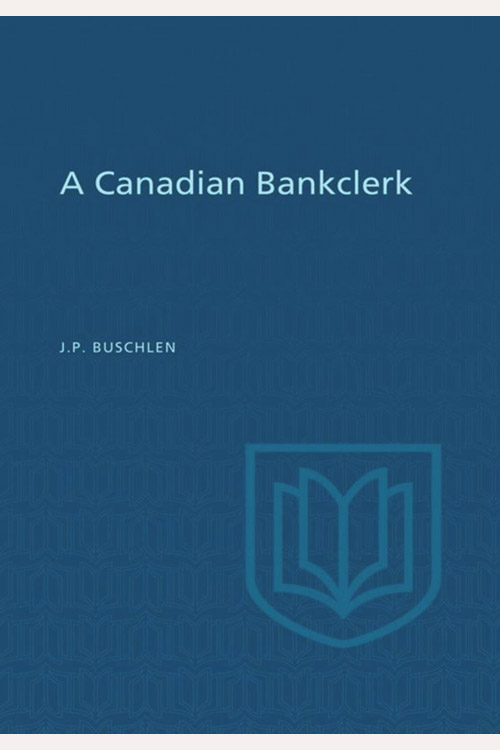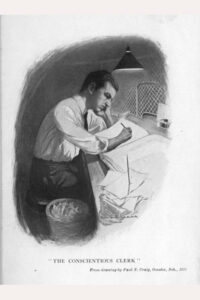
A Canadian Bankclerk
The remainder of the day’s work meant confusion and headaches for Evan. Before going to his boarding house for supper, he walked along one of the back streets of Mt. Alban. A song his sister used to sing seemed to dwell in the very air about him. It associated itself with home memories and sent a thrill through him. Mt. Alban was only thirty miles from Hometon, and yet Evan felt that he was gone from home forever. So he was—if he continued to work in the bank. He knew he could get home only for an occasional weekend, nor were the Hometon trains convenient to bank hours. There was no bank branch in Hometon, and he would never be located there. When the first move came, it would still take him further away. Evan sauntered, with his thoughts, past comfortable homes fronted with lawns and shaded by weeping willows. There is a peculiar melancholia about a Mayday; it affects the young bank clerk.
He walked by hedges beyond the end of Mt. Alban’s asphalt into the suburbs. Spring birds sing their thanks to Nature, and to the homesick heart, a bird’s singing is sadness. It is natural for such a heart to seek quiet. Evan had no desire for company. He wanted to think all by himself. His mind travelled in one circle, the arcs of home, school, and the bank. Yes, and Frankie Arling! Although only seventeen, he had a tenacious way of liking a girl, and Frankie had always appealed to him. He thought of her as he walked by the hedges. She, indeed, helped him, more than anything else, to forget the ordeal of his first few days’ clerkship. He shuddered when he thought of the hundred and one mysterious books in the office, so well known to the teller and Watson, and a shiver accompanied the thought of mail and copying books. Still, he viewed matters from a different angle when Frankie came forward in his mind. How worldly-wise he would be when he went home, and what a hit he would make with his own money in the ice cream places of Hometown! Wouldn’t Frankie be proud of him?
Exclamation marks hardly do justice to Evan’s enthusiasm as he allowed himself to speculate on the future. Being “good stuff” at the bottom, he forced himself, finally, on this May day walk, to look at the sunlight on the lawns and trees, and when he doubled back to the boarding-house, it was with a good imitation of his old football energy. At the table, he spoke blithely to the guests and was quite gay during soup. Cold roast beef brought a slight chill with it. The cake had something of a sour flavour. He drank his tea in silence. In the evening, he declined an invitation to a party extended to him over the telephone at the bank. After sweeping the office, he perched himself on a stool and wrote a letter home.
Before daylight disappeared, he “wound” the vault combination seriously, faithfully, and crept up the back stairs to his bed above the bank’s treasure. He soberly inspected a heavy revolver, placed it on a chair beside the bed, and retired with a sound not unlike a groan. Perry came in late and raised a dreadful hubbub. He smoked cigarettes in the room, whistled the raggiest rags, and tried his best to make things uncomfortable for the new man. Nelson ground his teeth beneath the sheets and wished he had been born strong. The first official question Evan was asked the following morning concerned the winding of the combination.
Read or download Book
J. P. Buschlen
John Preston Buschlen (1888-1966) was a Canadian author.
Biography
He also wrote under the pseudonyms A Flyer’s Dad, Don Juan, Jack Preston, and John Preston. His works include A Canadian Bankclerk (1913), The War and Our Banks (1914), The World War (1914), Behind the Wicket (1914), The Drummer (1915), Peter Bosten (1915), Finding His Balance; or, The Bank Clerk Who Came Back (1915), Romance and the West: Falling Petals (1918), The Donkey, the Elephant and the Goat (1920), Screen Star (1932), Curtain of Life (1934), Not Ashamed: A Romance of the Tropics (1934), Heil! Hollywood(1939), Senor Plummer: The Life and Laughter of an Old- Californian (1942), Assembly Call (1943), and The Desert Battalion (1944).






